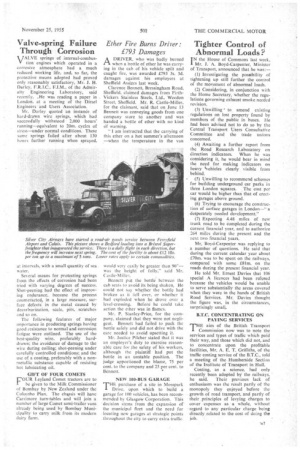Tighter Control of Abnormal Loads ?
Page 41

If you've noticed an error in this article please click here to report it so we can fix it.
'1N the House of Commons last week, I Mr. J. A. Boyd-Carpenter, Minister of Transport, announced that he was:—
(1) Investigating the possibility of tightening up still further the control of the movement of abnormal loads.
(2) Considering, in conjunction with the Home Secretary, whether the regulations governing exhaust smoke needed revision.
(3) Unwilling • to amend existing regulations on lost property found by members of the public in buses. He had been advised not to do so by the Central Transport Users Consultative Committee and the trade unions concerned.
. (4) Awaiting a further report from the Road Research Laboratory on direction indicators. When he was considering it, he would bear in mind the need for making indicators on heavy 'vehicles clearly visible from behind.
(5) Unwilling to recommend schemes for building underground car parks in three London squares. The cost per car would be higher than that of erecting garages above ground.
(6) Trying to encourage the construction of surface garages in London—" a desperately needed development,"
(7) Expecting 4.48 miles of new trunk road to be completed during the current financial year, and to authorize 264 miles during the present and the next two financial years.
Mr, Boyd-Carpenter was replying to a number of questions. He said that during the current calendar year about £70m. was to be spent on the railways, compared with some £81m. on the roads during the present financial year.
He told Mr. Ernest Davies that 106 special A licences had been refused because the vehicles would be unable to serve substantially the areas covered when they were in the hands of British Road Services. Mr. Davies thought the figure was, in the circumstances, surprisingly small.
B.T.C. CONCENTRATING ON PAYING SERVICES
riE aim of the British Transport Commission now was to note the services and types of traffic which paid their way, and those which did not, and to concentrate upon the profitable facilities, Mr. A. E. T. Griffiths, of the traffic costing service of the B.T.C., told a meeting of the Humberside Section of the Institute of Transport in Hull
Costing, as a science, had only recently been adopted by the railways, he said. Their previous lack of enthusiasm was the result partly of the monopoly they enjoyed before the growth of road transport, and partly of their principles of levying charges to cover expenses as a whole, without regard to any particular charge being directly, related to the cost of doing the job.




































































































